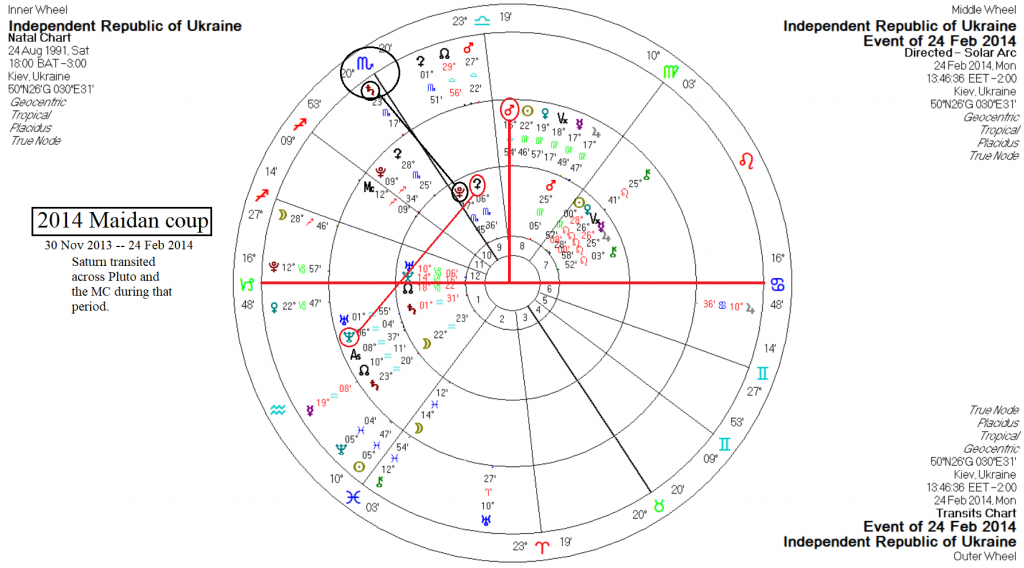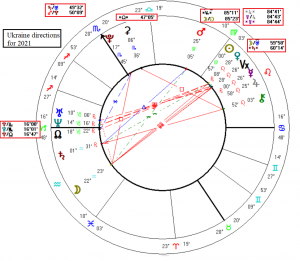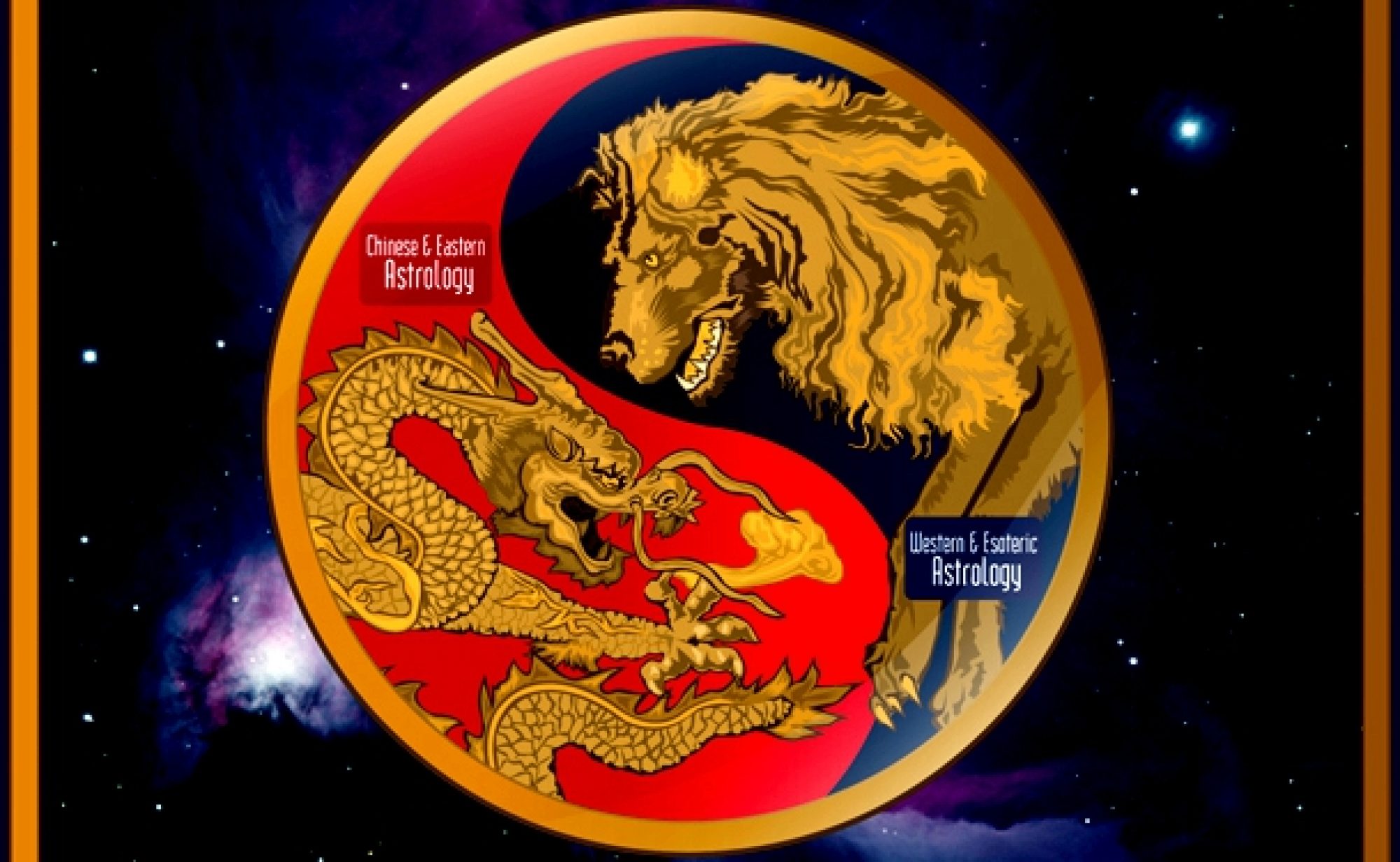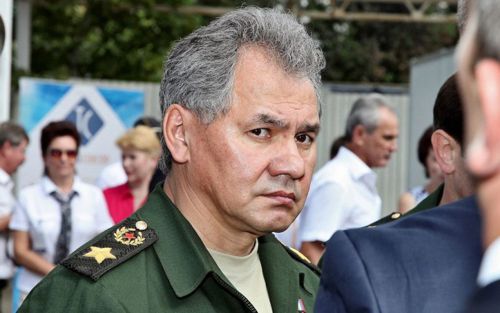Following from the post about Syria, we move on to consider the situation in Ukraine, and whether or not Ukrainian and NATO partners would rather speak with Lavrov or with Shoigu. It would appear at the moment that Ukrainians, at least the ones in power in Kiev and nationalist minorities, would prefer to speak with Shoigu, given the points outlined in the previous article. There is also an ulterior motive with the NATO forces – largely an Atlanticist contingent – in pushing for a conflict in eastern Ukraine. We will outline what that might be here, as well as what the astrology is showing for Ukraine, which is looking to be increasingly fractious.
Before we launch into our investigations, it is useful to know a little of the history and ethnicity of what is known as today’s Ukraine. The Ukraine, translated as ‘the Borderlands’, has had a long and troubled history, having undergone many transformations over the centuries and only very recently having any kind of independence or sense of statehood. It could be argued it has yet to have any sense of a unified statehood. Ukraine has been variously divided among empires since the 13th century, thus seeing a mix of cultures over that period. There is a primary cultural divide in Ukraine across the Dnieper River, with the west of the nation being more aligned with Poland and Romania.
The western part of Ukraine is comprised on the regions of Galicia and Volhynia, which are closely tied to Poland by historical precedent and culture, while there are two smaller regions – Carpathian Ruthenia and Bukovina – more closely associated with the old Czechoslovakia and Romania, respectively. The west of the Ukraine is where the nationalist factions of Ukraine are located, while eastern Ukraine is more sympathetic with Russia and is more populated with ethnic Russians. Hence, we see already the origins of the various conflicts within Ukraine, and which have yet to be resolved. That brings us to the present day.
After WWII Ukraine attained its present borders. In 1954, control of Crimea was transferred from the Russian to the Ukrainian Soviet republics, a move that remains controversial to this day. The Russians maintained the naval base for their Black Sea fleet at the port of Sevastopol on the Crimean Peninsula by treaty. But regardless of the controlling nation, Crimea had been majority ethnic Russian since its days in the Russian Empire. That was a big deciding factor in Crimea’s return to Russia in 2014, along with the little matter of the naval base.
Since 2014, Russia’s relations with the West have soured considerably. The coup in Ukraine in 2014 – labelled the ‘Revolution of Dignity’ by Ukrainians – with the subsequent instalment of a Russophobic government in Kiev, resulted in the eventual return of Crimea to Russian control, which it had held from 1783 to 1991, with a brief independence for Ukraine from 1917 to 1921. With the 2014 coup, there were designs by NATO powers to close the naval base of the Russian Black Sea Fleet in Sevastopol, with the aim of converting it to a NATO base, thus shutting off Russian naval control of the Black Sea and hence the Mediterranean via the Bosporus.
The other aim of the NATO bloc was to have a large NATO state right on the Russian border. Russia saw this clearly and moved quickly to garner support for the majority Russian demographic in Crimea to re-join the Russian fold, which they voted to do by a large majority, fearing what would happen once the Ukrainian nationalists made their way to the peninsula. The Western nations and NATO forces especially see the loss of Crimea as an ‘illegal annexation by Russia’, while Russians largely saw it as a return of Crimea to the fold. In effect, the Russian establishment saw the return of Crimea as a major security issue, in terms of Realpolitik, and moved quickly to secure the peninsula, subsequently connecting it to the Russian mainland via the Kerch Strait Bridge.
All the preceding relating to the return of Crimea to Russia and the 2014 coup has spoiled any plans by NATO states to have a large contiguous nation, rich in resources, right on Russia’s borders. It would have placed NATO bases and forces within 500 km from Moscow – a short flight by missile – and only 19 km across the Kerch Strait from Crimea to Russia. The Russians clearly were not going to simply roll over and let NATO take over the whole of Ukraine. The US and EU badly miscalculated Russia’s response to the situation in Ukraine as a result of the coup, thinking Russia to be weak at the time. This brings us to consider the ulterior motive for possibly starting a conflict with Russia in Ukraine now.
There are several factors at play in considering Russia, NATO and Ukraine, as follows:
- The Germans are close to having the Nord Stream 2 pipeline completed, which would seal away any chance of Germany or Europe in general buying significant quantities of expensive American LNG. It would also mean more money flowing into Russian coffers, more energy dependence on Russia for energy supply and therein being able to shut off gas to Ukraine if the situation got dire and – here is the major underlying concern by the West – closer economic cooperation between Russia and Germany. The NATO was formed to “keep the Russians out, the Americans in and the Germans down.” it appears not much has changed.
- The EU is increasingly looking fractious, is beginning to seriously question American motives and certain EU states are beginning to look East. European business interests have generally good relations with Russia.
- The Beltway and the British want to split the EU away from Russia, and the easiest way to do so is to foment a conflict in Ukraine that would cause an overt Russian intervention in eastern Ukraine. Basically, Ukrainians would be used as pawns for American and Atlanticist interests. Such an intervention would cause Ukraine to split into two or three districts, essentially across the Dnieper divide.
If the EU was likely to back any sort of ‘humanitarian intervention’ in Ukraine in the face of ‘Russian aggression’ there would ensue a hard ‘Iron Curtain’ between Russia and the rest of Europe, probably much to the delight of the US and other allied states. Such a situation would decidedly worsen the economics of the EU, though, because the EU would then have to decide between China and the US, with Russia now having very close relations with China, and that in turn would worsen relations between EU states, as in between Eastern and Southern Europe and the Northern and Western European states.
But there is a larger concern relating to Ukraine, because in the event of any military action against eastern Ukraine (Russia will not instigate any such action), NATO will not intervene on Ukraine’s behalf. No EU states, nor the British, are prepared to fight any sort of a war, much less against Russia. Failure for NATO to support Ukraine in such a case would send a very bad message across the globe as to American and NATO support and accountability, and the resulting economic fallout for the collective West would be considerable. Consider that the EU has around 470 million people, whereas the greater Eurasian region has on the order of ten times that number. If the latter decides to trade with China and shun the west, well…one can do the math. That brings us to Ukraine’s astrology. We start with the Euromaidan coup chart, to show what sets the tone for the present day. The chart is below (bigger):

The immediate factors that stand out in the chart are the directed Mars squaring the Ukraine Horizon axis, showing the violence and blurring the boundaries between belligerents – the public, foreign actors, etc. The latter is indicated by Mars being in the 8th house (transformation and death, as well as foreign banking interests), and also at the Neptune/Node midpoint: “The experiencing of deceit and untruthfulness from others…” because that midpoint is also the Ascendant, and, “The experiencing of disharmony when working or living together with other people, the inability to adapt or to adjust oneself to circumstances or conditions. – A disharmonious association, association with sick people.”
Then, there was the transit of Saturn, first over Ukraine’s Pluto, ruling the 10th house (the sitting ruler/government), and then over the MC. So, we has Sat=Plu/MC: “Self-sacrifice. The attainment of one’s objectives through sacrifices. – A toilsome struggle of existence, a death or a bereavement.” Saturn transiting across the MC is the indicator of a culmination in one’s career path. In the case of a nation, it would show as the height of international esteem and the fulfilment of national ambitions. Instead, what we saw there was a constitutional crisis, a violent overthrow of the government, with the leader fleeing to Russia.
It was clear Ukraine was at a crossroads. The natal Ceres was activated then by directed Neptune, showing the nebulous, even nefarious nature of what was taking place, with transiting Pluto at the Uranus/Neptune midpoint driving the point home: “A person who is influenced or impressed very easily by others. The inclination to remain at the mercy of external conditions and circumstances without trying to make a firm stand. – The abandonment of resistance, the necessity to give in, great losses, calamities, catastrophes.” That transit took place in Ukraine’s 12th house, the house of hidden enemies of the state. Maidan was essentially a color revolution, fomented by the US and EU, but mostly by the US. That brings us to today.
The current directions to Ukraine’s chart are below (bigger):

The main standouts are the two midpoint directions to the Ukraine MC:
- Mars/Plu=MC: “The misfortune to face overwhelming force without power, danger through the intervention of Higher Power, operation.”
- Sat/Ura=MC: “Making the highest demands upon one’s own strength, rebellion, provocation. – The act of separating oneself from others.”
These in turn are accompanied by the Sun/Moon midpoint to Ukraine’s Mars: “The urge to bring to fruition ideals and wishes…the realisation of joint objectives” we might wonder what those ‘joint objectives’ are, given the shipment of heavy weapons east and the recent visit from the NATO contingent. Perhaps they want to definitively settle the ‘Donbass question’. If so, there will be a resolution, for certain. The Russians possess the overwhelming force in the region, referring to the Mars/Pluto midpoint.
Then, there are the directions ot the Ascendant, reflecting the public mood:
- Plu/Node: “The desire to gain influence upon the public.”
- Nep/MC: “The inclination to live in a world of illusion and unreality, acting and pretending. – Taking the wrong path in life, the pursuit of wrong objectives, uncertainty or insecurity.”
The first one is almost exact now, with the government in Kiev seeking to rally public support to its cause. It is not doing so well, especially with Saturn directed to the nation’s Sun. That is followed immediately by the 2nd midpoint. The meaning could not be clearer. And in line with the Saturn direction, that also forms a close midpoint with the Moon and Uranus: “Striving for independence, the desire to separate oneself from others suddenly, the suffering of sudden damage. Sudden illness.” So, if we had to toss a coin, in which nation will various forces be talking to Shoigu – Syria or Ukraine? The truth is, we hope for neither of those.
Syria looks to be more stable at the moment, given the directions and transit, though it will still be under heavy stress this year. And in Ukraine, we may be looking at a constitutional crisis rather than a military confrontation, or an internal overthrow of Zelensky’s government. Zelensky may try some sort of military action in the Donbass as a distraction from his troubles, egged on by NATO forces, but given Mars is not making directions to significant points in Ukraine’s horoscope, what appears is growing unrest in Ukrainian society, disillusionment with the course of events and policy since Maidan, and an ‘operation’ on, not by the government. And once Nord Stream 2 is finished, the loss of income from gas transit to Europe will further exacerbate Ukraine’s fracturing.
Neither the US nor the EU are going to rush to the aid of Ukraine. They have created a monster there in ousting the government in 2014. Ukraine is suffering the same fate as did Russia in the ‘90s. As a result, the Russians have been watching closely and they, too, have no great desire to get entangled in Ukraine. But that is exactly the hope of NATO forces. It would be a big drain on Russia to do so and, it would be hoped by the Western powers, weaken Russia’s influence elsewhere.
The one thing to be noted is the Neptune/MC direction to the Ascendant, in that there has been a deliberate deception foisted upon the Ukrainian leadership. Since analysts in the know have surmised NATO forces will not intervene in Ukraine should violence erupt, the recent visit by the American general and the NATO contingent would appear to be an attempt to provoke Russia instead of empowering the Ukrainian military, which itself is in a poor state. Not much has changed in that regard since 2015.
But in fact, there are no directions by Mars to points in Ukraine’s chart for the next seven years, not in terms of stressful aspects. Instead, currently we have both Mercury and Jupiter conjunct Ukraine’s Mars by direction, following quickly upon the directed Sun/Moon midpoint, giving us Mer/Jup=Mars: “Action guided by common-sense, oratory, the execution of plans, a good critic, a discussion-speaker. – Speaking and acting in coordination, a successful discussion or conference.” It is usually the militaries of the world who have better sense about whether or not war is a good idea, paradoxical as that may sound. We would like to think there are people in Ukraine who exercise good sense.
Maybe, just maybe, Ukrainians will see the folly and danger in any sort of military action in the Donbass and pull back. Perhaps they may want to reconsider the recent actions there and re-enter into the Minsk accords, which they have routinely broken. Talking with Lavrov would seem to be a good idea at this point.
When I was growing up it was common talk among parents and children for parents – usually the father – to take an errant child ‘into the woodshed’ for ‘conversations’ about the child’s behavior. Normally, that would have resulted in a good ‘whuppin’ and a sore bottom for a few days, with attitudes thereby adjusted. Those days are long gone, given attitudes to corporal punishment now. But given what we know about Shoigu’s professional tools and qualifications these days, it is better to avoid having to pay a visit to Shoigu’s woodworking shop – unless of course you want to share woodworking tips and enjoy shared skills. ‘Woodshedding’ also means to hone one’s skills to perfection through intensive practice, of which the Russians have done plenty in Syria since 2015. Otherwise, Lavrov is always available for consultations.
Featured pic from Open Democracy

